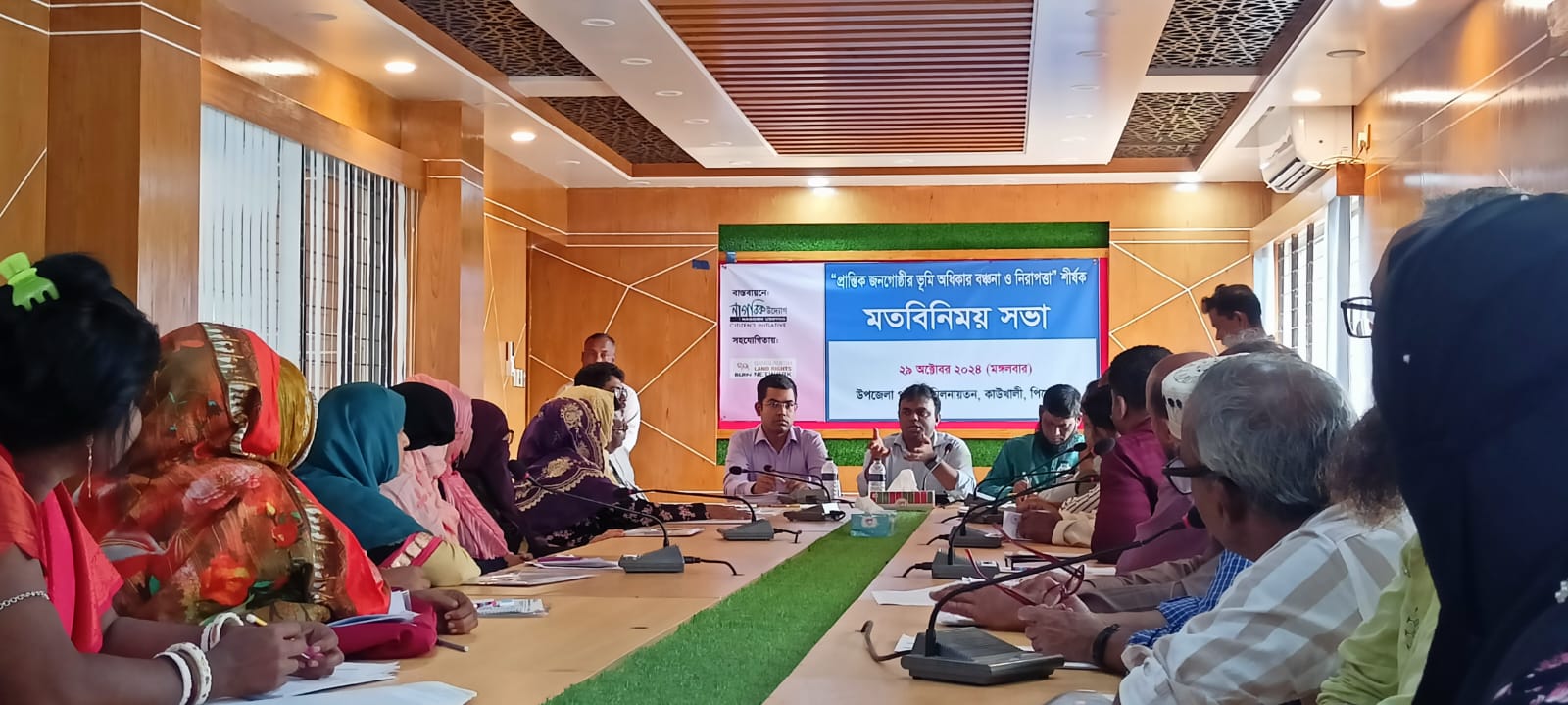The deprivation of land rights remains a persistent and painful reality for thousands of landless individuals in Bangladesh. Nowhere is this more evident than in Kawkhali, Pirojpur, where marginalized communities continue to face insecurity, land grabbing, and systemic exclusion from formal land ownership mechanisms.
On Tuesday, October 29, 2024, Bangladesh Land Rights Network (BLRN), in collaboration with local partners, hosted a critical multi-stakeholder meeting titled “Deprivation of Land Rights and Security for Marginalized Communities.” The event served as a vital platform for community members, civil society organizations, and government officials to engage in open dialogue about the current land tenure crisis in the region.

Meeting Highlights and Key Participants
Held at the Kawkhali Upazila Parishad auditorium, the event brought together a diverse group of participants representing both grassroots communities and institutional leadership.
Notable attendees included:
-
UNO, Kawkhali Upazila – Chief Guest
-
Assistant Commissioner (AC) Land, Kawkhali Upazila
-
Representatives from CSOs and NGOs
-
Landless farmers, women, and displaced individuals
-
Local journalists and community advocates
-
Youth leaders and volunteers engaged in land rights monitoring
This inclusive platform enabled marginalized individuals to share their lived experiences, while local authorities listened and responded to community grievances with a commitment to institutional reform.
Voices from the Ground: Stories of Landless Women and Farmers
At the heart of the meeting were the testimonies of landless farmers and women, who courageously shared the everyday challenges of living without secure land tenure.
-
A widow from Chalitabunia village described her decade-long battle to reclaim her ancestral land, repeatedly denied due to missing documents and local elite interference.
-
A farmer from Dhaoa village explained how he was evicted from khas land without notice, despite receiving prior verbal confirmation of allocation from local authorities.
These deeply emotional narratives exposed how deprivation of land rights translates into broader vulnerabilities—economic hardship, gender-based exclusion, and legal invisibility.
“We don’t want charity,” one woman said. “We want the land that is rightfully ours.”
Their stories offered undeniable evidence that existing land governance mechanisms are failing those most in need.
Administrative Insights: Statements from UNO and AC Land
The UNO of Kawkhali, serving as the event’s Chief Guest, acknowledged the structural gaps in implementing land distribution policies. In a rare moment of candor, the UNO stated:
“We have the legal framework, but the delivery system is weak. Without proper monitoring and community verification, genuine landless families are left out.”
The AC Land emphasized efforts to digitize land records and encouraged community members to participate in upcoming landless registration drives. However, civil society representatives highlighted that past drives have often lacked transparency and failed to engage women and indigenous voices.
Stakeholder Perspectives: Civil Society and Media Reflections
Local CSO partners, including BLRN member organizations, stressed the need for community-driven reforms. One representative from a women’s rights group pointed out that land access for women remains particularly restricted due to patriarchal customs, lack of joint titles, and exclusion from land tribunals.
Journalists present at the event committed to covering future land-related cases and exposing irregularities in lease allocations, especially regarding Balumhal sand leases, which were repeatedly cited as corrupt and inaccessible to common people.
The forum also discussed integrating climate resilience and livelihood programs with land reform, linking land security with long-term rural development.
Identified Challenges and Gaps
Through open dialogue, the following systemic challenges were identified as central to the deprivation of land rights in Kawkhali:
-
Inaccurate identification of the landless due to outdated records and political interference
-
Corruption in land allocation and Balumhal sand leasing processes
-
Lack of gender-sensitive policies, excluding landless women from benefits
-
Weak institutional accountability, particularly at the Union Parishad level
-
Legal illiteracy among claimants and inaccessibility of formal complaint mechanisms
These issues collectively contribute to land insecurity, food insecurity, and multidimensional poverty.
Recommendations and Way Forward
Based on the discussions, a set of concrete recommendations emerged to address the ongoing deprivation of land rights:
1. Community-Led Identification
-
Initiate participatory landless surveys with involvement of women, indigenous communities, and local youth.
-
Use mobile-based tools and open data platforms to verify results.
2. Transparency in Lease Allocation
-
Publish Balumhal lease data publicly.
-
Reserve a fixed quota for landless groups and women cooperatives.
3. Gender-Inclusive Land Policies
-
Ensure joint land titles for married couples.
-
Provide legal aid and training for women to understand and claim their rights.
4. Digitization and Public Access
-
Accelerate digitization of land records.
-
Install digital kiosks at Union Parishad offices for public record access.
5. Monitoring and Grievance Redress
-
Establish local land rights monitoring committees.
-
Introduce an independent grievance redressal mechanism with civil society oversight.
These actions, if supported through political will and sustained funding, can drastically reduce the barriers preventing marginalized communities from enjoying secure land rights.
Conclusion: Bridging Policy and Practice for Land Justice
The deprivation of land rights in Kawkhali is both a local crisis and a national concern. The 2024 stakeholder meeting has shown that while awareness is growing, change will only come through a coordinated, transparent, and community-driven approach.
By centering the voices of landless women, farmers, and indigenous people, the event marked a powerful step toward reclaiming the promise of equitable land governance in Bangladesh.
The message is clear: land rights are human rights—and the time to act is now.
Learn More about- BLRN, World Bank Report on Land, 2024
